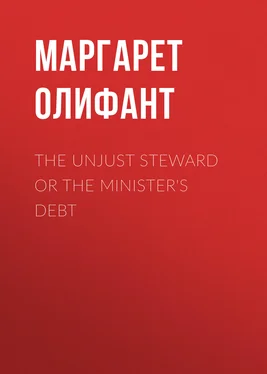Маргарет Олифант - The Unjust Steward or The Minister's Debt
Здесь есть возможность читать онлайн «Маргарет Олифант - The Unjust Steward or The Minister's Debt» — ознакомительный отрывок электронной книги совершенно бесплатно, а после прочтения отрывка купить полную версию. В некоторых случаях можно слушать аудио, скачать через торрент в формате fb2 и присутствует краткое содержание. Издательство: Иностранный паблик, Жанр: foreign_prose, literature_19, foreign_antique, на английском языке. Описание произведения, (предисловие) а так же отзывы посетителей доступны на портале библиотеки ЛибКат.
- Название:The Unjust Steward or The Minister's Debt
- Автор:
- Издательство:Иностранный паблик
- Жанр:
- Год:неизвестен
- ISBN:нет данных
- Рейтинг книги:3 / 5. Голосов: 1
-
Избранное:Добавить в избранное
- Отзывы:
-
Ваша оценка:
- 60
- 1
- 2
- 3
- 4
- 5
The Unjust Steward or The Minister's Debt: краткое содержание, описание и аннотация
Предлагаем к чтению аннотацию, описание, краткое содержание или предисловие (зависит от того, что написал сам автор книги «The Unjust Steward or The Minister's Debt»). Если вы не нашли необходимую информацию о книге — напишите в комментариях, мы постараемся отыскать её.
The Unjust Steward or The Minister's Debt — читать онлайн ознакомительный отрывок
Ниже представлен текст книги, разбитый по страницам. Система сохранения места последней прочитанной страницы, позволяет с удобством читать онлайн бесплатно книгу «The Unjust Steward or The Minister's Debt», без необходимости каждый раз заново искать на чём Вы остановились. Поставьте закладку, и сможете в любой момент перейти на страницу, на которой закончили чтение.
Интервал:
Закладка:
“It is not our affair, Mary; he had full command of his faculties, and it was his own to do what he liked with it,” her husband said, though with faltering lips.
“Well, that is true,” she replied, but doubtfully: “I am not denying a man’s right to do what he likes with his own. And if it had been only you, his minister, that perhaps he owed much more to, even his own soul, as Paul says–”
“No, no; not so much as that.”
“But if there are many,” Mrs. Buchanan went on, shaking her head, “it might be a sore heritage for Frank. Claude, if ever in the days to come we can do anything for that lad, mind I would think it was our duty to prefer him before our very own: for this is a great deliverance, and wrought, as you may say, at his cost but without his consent–”
“My dear, a sum like that,” said Mr. Buchanan, with a faint smile and a heavy heart, “is not a fortune.”
“That is true, but it is a great deliverance to us; and if ever we can be helpful to him, in siller or in kindness, in health or in sickness–”
There came a rush of tenderness to Mrs. Buchanan’s heart, with the tears that filled her eyes, and she could say no more.
“Yes, yes,” he said a little fretfully, “yes, yes; though he had no merit in it, and not any such great loss either that I can see.”
She judged it wise to leave the minister to himself after this; for, though nerves were not much thought of in those days, she saw that irritability and a tendency to undervalue the great deliverance, which filled her with such overflowing gratitude, had taken the place of more amiable feelings in his mind. It was better to leave him quiet, to recover from his ill mood, and from the consequence of being overdone. “I have so many things to take off my mind,” she said to herself. Perhaps she thought the minister’s cares—though most people would have thought them so much more important—nothing to hers, which were so many, often so petty, so absorbing, leaving her no time to brood. And had she not provided him with the new Waverley , which most people thought the best anodyne for care—that is, among the comforts of this world, not, of course, to count among higher things?
But Mr. Buchanan did not, I fear, find himself capable of having his mind taken off, even by the new Waverley . He was spared, he said to himself, from actual guilt.—Was he spared from actual guilt? He had not required to take his bill and write fourscore. But for that one little word the— the fifty (how small a matter!) he had said nothing: and that was not saying anything, it was merely an inference, which his next words might have made an end of; only, that Morrison would not hear my next words. If there was a fault in the matter, it was Morrison’s fault. He repeated this to himself fretfully, eagerly, impatient with the man who had saved him from committing himself. Never, never would he commit any business to Morrison’s hands! Such a man was not to be trusted; he cared nothing for his client’s interest. All that he was intent upon was to relieve the debtor, to joke about the “friendly body,” who was so kind, even in his grave. “A sore saint for his heir,” Morrison had again said, as was said of the old king—instead of standing for the heir’s rights as he ought to have done, and hearing what a man had to say!
And this then was the end of it all—salvation—from all the consequences, even from the very crime itself which he had planned and intended, but had not required to carry out. He had saved everything, his conscience, and his fifty pounds, not to speak of all the rest, the sum which his wife had planned by so many daily sacrifices to make up. He had not, after all, been like the unjust steward. He had said nothing, had not even written the fourscore; he had been saved altogether, even the fifty he had offered. Was this the Lord’s doing, and marvellous in our eyes—or what was it? Mr. Buchanan put away the Waverley , which was given him to comfort him, and took up the Bible with the large print. It opened again at that parable; and then, with a great start of pain, he recognised his fate, and knew that henceforward it would open always at that parable, now that the parable was no longer a suggestion of deliverance to him but a dreadful reminder. A convulsive movement went through all his limbs at that thought. Mr. Buchanan had often preached of hell, it was the fashion of his time; but he had never known what he himself meant. Now he knew: this was hell where their worm dieth not, and their fire is not quenched. It lay here, not in a vague, unrealised region of fire and brimstone; but here, within the leaves of the New Testament, which was his chief occupation, inspiring all the work of his life. This was hell—to see the book open, the book of life, always at that one place. He had not to wait for it; the worm had begun to gnaw and the fire to burn.
CHAPTER V.
MARION AND ELSIE
It was not till a long time after this that the Rev. Matthew Sinclair, who was the betrothed of Marion Buchanan, got a kirk, and the faithful pair were able to marry. The snowy heaps of Marion’s linen, which her mother now spoke of, in the bosom of the family, as in reality a present from old Mr. Anderson, seeing that it was paid for by a loan from him, generously converted into a legacy when he died—had lain spread out, with sprigs of lavender between the folds, in the big press at the head of the nursery stairs for nearly two years, during which time Elsie grew into almost a young woman. Rodie, too, became an ever more and more “stirring” school-boy, less disposed to sit and read from the same book with his sister, and more occupied with outdoor games and the “clanjamfry,” as his mother said, of school-fellows and playfellows who were always hanging about waiting for him, or coming with mysterious knockings to the door to ask him out. Some of them, Mrs. Buchanan thought, were not quite proper comrades for the minister’s son, but the framework of juvenile society in St. Rule’s was extremely democratic, all the classes going to school together according to Scotch precedent—the laird’s son and the shoemaker’s on the same bench, and Rodie Buchanan cheek by jowl with the fisher laddies from east the town. In the play hours, it was true, things equalised themselves a little; but there was certainly one fisher laddie his prompter and helper in school, who kept a great ascendancy over Rodie, and would lead him away in long tramps along the sea-shore, when he might have been at football or “at the gouff” with companions of his own standing, and when Elsie was pining for his society at home. Elsie felt the partial desertion of her brother extremely. She missed the long readings together in the turret and elsewhere, and the long rambles, in which Johnny Wemyss had become Rodie’s companion, apparently so much more interesting to him than herself. Johnny Wemyss, it was evident, had a great deal of knowledge, which Elsie was inclined, in her ignorance, to be thankful she did not possess; for Rodie would come in with his pockets all full of clammy and wet things—jelly-fish, which he called by some grand name—and the queer things that wave about long fingers on the edges of the pools, and shrink into themselves when you touch them. This was before the days when sea-anemones became a fashionable pursuit, but children brought up by the sea had, of course, known and wondered at these creatures long before science took them up. But to bring them home was a different matter; filling the school-room with nasty, sticky things, which, out of their native element, decayed and made bad smells, and were the despair of the unfortunate maid who had to keep that room in order, and dared not, except in extremity, throw Rodie’s hoards away. “It is not Rodie’s fault; it is Johnny Wemyss that just tells him nonsense stories,” Elsie said. She would have given her little finger to have gone with him on those rambles, and to have heard all about those strange living things; but already the invisible bonds that confine a woman’s movements had begun to cramp Elsie’s free footsteps, and the presence of Johnny Wemyss made, she was well aware, her own impossible, though it was just Johnny Wemyss’s “nonsense stories” that she desired most to hear.
Читать дальшеИнтервал:
Закладка:
Похожие книги на «The Unjust Steward or The Minister's Debt»
Представляем Вашему вниманию похожие книги на «The Unjust Steward or The Minister's Debt» списком для выбора. Мы отобрали схожую по названию и смыслу литературу в надежде предоставить читателям больше вариантов отыскать новые, интересные, ещё непрочитанные произведения.
Обсуждение, отзывы о книге «The Unjust Steward or The Minister's Debt» и просто собственные мнения читателей. Оставьте ваши комментарии, напишите, что Вы думаете о произведении, его смысле или главных героях. Укажите что конкретно понравилось, а что нет, и почему Вы так считаете.












